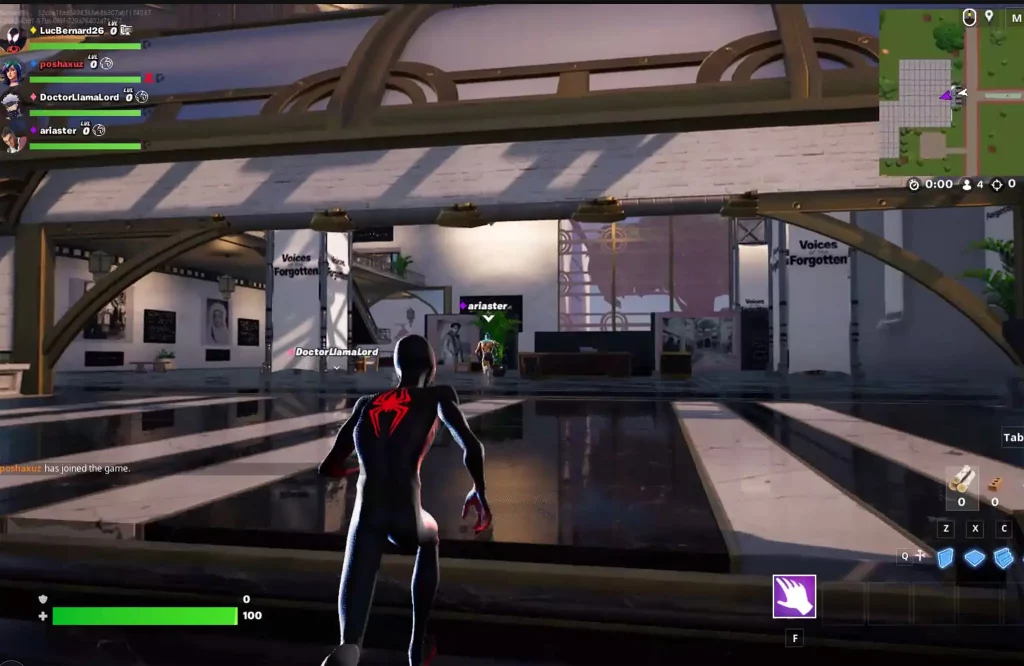Gaming and the Jewish Holocaust

Fortnight Video Game Screenshot of Jewish Holocaust Museum
Professor Joe Goldblatt
When I was a young father I took my children to dinner with another young parent who came from the midwest of the USA and by occupation was a very successful female lawyer. During dinner we discussed the recently released film Schindler’s List and she shocked me by stating “I do not understand what is the big deal and continuing fascination with the Jewish Holocaust? It happened a long time ago.” I was so shocked at her comment that I told her I was feeling unwell and took my children with me as we walked into the bright sunlight. Despite the beautiful weather I felt a dark cloud hovering above me because the highly intelligent woman who had made such callous comments was Jewish.
Perhaps this is why when I learned this week that the video gaming company Epic Games in their franchise Fortnite has installed within their commercial enterprise a sequence entitled Voice of the Forgotten that features a Jewish Holocaust Museum. The new sequence does command that viewers / players abide by these rules: “No shooting. No shouting, No Break Dancing” within the museum. However, this warning is not enough for me. I want them to put some stronger action behind their words.
Although I have no direct knowledge of the Jewish holocaust through a family member I have met many survivors and I wonder how they would feel about having their life changing experience linked to a game that earns all of its revenue by pitting one player against another in violent combat. I further wonder how they would feel about having their experience imbedded in this game through the insertion of a Jewish Holocaust Museum that warns players not to break dance when inside?
Although there are many good arguments about using video gaming and other new media to reach younger generations and new demographics in order to educate them about the holocaust, I believe this is not the best method. The USA head of the Anti – Defamation League recently told the New York Times that “Until the game industry can change the norms of hate and abuse in online multiplayer games, we cannot view experiences like these as a true alternative to more traditional forms of Holocaust education.”
Fortnite has 70 million active players from all over the world and it can be argued that this is a unique opportunity to broaden the base for holocaust education. The game designer stated that while hundreds of millions of US dollars are spent on building holocaust museums, only 20 percent of the US general public have visited one.
My concern is that despite their most noble intentions the strategy of linking something as serious as the persecution and execution of over 6 million Jews within a video game trivialises this tragic episode in human history. I wonder why the owners, investors, and designers of these games could not instead donate some of the millions of dollars in profits they receive to support holocaust education throughout the world? The Auschwitz / Bergen – Belzen Memorial and Museum, the Shanghai Jewish Refugee Museum, or your local or national holocaust museum would be a good place to start.
In January 2024, in commemoration of Holocaust Remembrance Day, the Edinburgh Interfaith Association in collaboration with the German Consulate of Edinburgh will bring to Scotland’s capital city a ground beaking exhibition from Berlin, Germany. The Polenaktion exhibition examines the unique mass expulsion of 17,000 Jews of Polish citizenship living in the German Reich to the Polish border in October 1938, the so-called “Polenaktion”. The Scottish Parliament, the University of Edinburgh, the Edinburgh Jewish Cultural Centre, and many others are working together to share this dramatic story of the plight of refugees that is certainly relevant today.
In my view, working together to tell the horrific story of the persecution and extermination of human lives is far better than creating a video game that warns users not to misbehave in a virtual holocaust museum. Whilst our upcoming Polenaktion exhibition may not reach 70 million gamers, hopefully those who do attend will not require a warning to refrain from shooting, shouting, nor break dancing and I believe with all my heart that this is a better place to start to both reverentially honour and hopefully learn from this sad chapter in human history. What we need now is not a new game about the holocaust. We need a new strategy and better resources to insure one never occurs again.
Professor Joe Goldblatt is Emeritus Professor of Planned Events at Queen Margaret University in Edinburgh, Scotland. His views are his own. To learn more about his views visit www.joegoldblatt.scot
